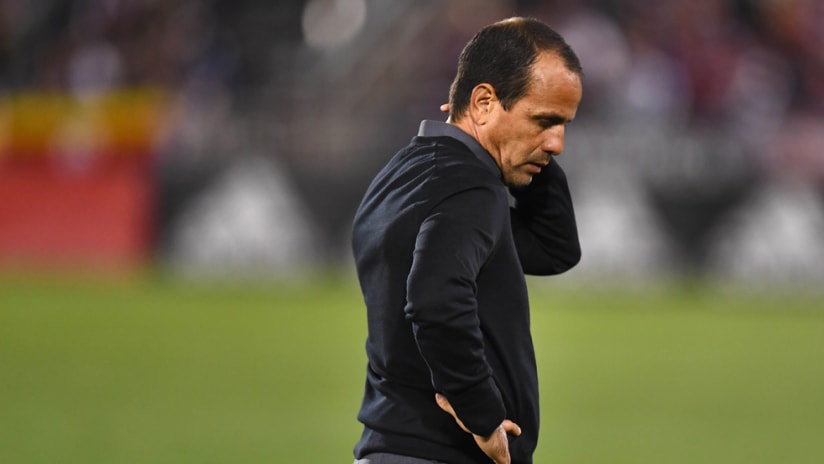I’ll start with a confession: I like Oscar Pareja.
I’ve found FC Dallas’ head coach to be one of the most refreshing voices in MLS, one who’s made FCD into a truly pan-American organization, equally inspired by Latin American influences and the loamy clay of their home soil in North Texas. He’s led the way in building a complete club in Frisco, based on a thoughtfully-constructed, bottom-up philosophy of player development and roster building.
They call him “Papi” around Toyota Stadium for a reason. I feel confident that Wednesday’s disappointing 2-1 home loss to the Portland Timbers in the 2018 MLS Cup Playoffs Knockout Round won’t shake management’s faith in his approach, or his leadership. Perhaps the Imagine Dragons curse will be tabbed as the real culprit:
But there is some soul-searching in store for Pareja and his colleagues on the prairies this winter.
Los Toros Tejanos seem to have a playoffs problem. They’ve qualified for the postseason in four of Pareja's five seasons in charge, during which time they’ve also won a Supporters’ Shield-U.S. Open Cup double (2016), made an inspiring, but ultimately tragic run in the 2017 Concacaf Champions League and earned a place in the MLS regular-season elite, twice reaching 60 points and nearly doing so again this year.
Those are all good things. Their postseason record is less accomplished: FCD have won just one Knockout Round game (over Vancouver in 2014) and one two-legged series (over Seattle, via penalty-kick shootout, in 2015) in the fall crucible of the Audi MLS Cup Playoffs.
Under Pareja, the closest they’ve come to hoisting that trophy is the 2015 Western Conference Championship, where they fell in agonizing circumstances – at home in the second leg – to the eventual champions ... Portland, which lends a sad sort of circularity to Wednesday’s loss.
“It is frustrating to get to this point again, and at this stage not being able to advance,” Pareja said in Wednesday’s postgame press conference. “So to our fans and the people who have worked with this franchise and the people who have supported us and are expecting us to keep moving forward and reach that goal of being in MLS Cup and winning it, I want to tell them that I am terribly sorry for not being able to do that.”
Dallas’ playoff campaigns have been cut short by a range of factors: unfortunately-timed injuries to key players, in-form opponents, and some ultimately unsuccessful calls by Pareja.
Until this year their prospects of greatness often ebbed and flowed with the fitness of Mauro Diaz, the magical Argentinean playmaker who made FCD special when healthy and sharp, but was sidelined all too often, forcing drastic shifts in tactics and outlook in his absence. In the case of the 2016 postseason, which Dallas entered as the West’s top seed, Pareja fatefully chopped and changed both his team’s personnel and shape, a three-man back line proving disastrous in their semifinal series with eventual champs Seattle.
When Diaz was sold earlier this year, the hope was that Pareja’s side could become more adaptable and resilient. That was a more general objective as well: The club had gradually opened up the purse strings to augment their waves of Homegrown talent and under-the-radar Latin American imports with experienced signings like Reto Ziegler and Roland Lamah. Diversity and flexibility were seen as a means to navigate these win-or-else situations.
Yet in many ways they’re seemingly right back where they started. The goals dried up down the stretch, even as they tended to amass higher expected goals numbers than their adversaries. This time Pareja kept the faith with his first-choice XI. No matter. Pablo Aranguiz, Diaz’s hand-picked playmaking replacement, didn’t even make Wednesday’s 18-man gameday roster, and no one stepped up to take responsibility in time to save a season that once looked bound for the back end of the bracket.
“If you don't put the ball in the back of the net, you don't get points,” Pareja conceded. “If I say we play well, but we don't score goals, I'm probably not being very objective.
“I thought we were not clean in both [penalty] areas,” he said. “It could be something psychological, it could be something else, it could be – it's worth it to make a big analysis and we'll do it, because this is very unexpected for me. We were fine, we had a very good season.”
Whether the Cup chase requires minor tweaks or something deeper, Pareja, club president Dan Hunt and VP of soccer operations Luiz Muzzi will have time to chew on those decisions as the playoffs roll on, once again, with FCD's run at an early close.













